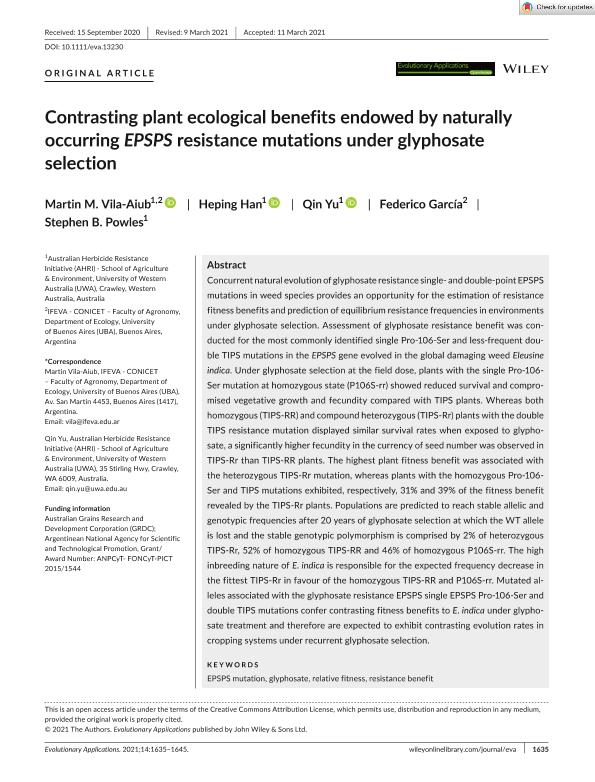Artículo
Contrasting plant ecological benefits endowed by naturally occurring EPSPS resistance mutations under glyphosate selection
Fecha de publicación:
03/2021
Editorial:
Wiley Blackwell Publishing, Inc
Revista:
Evolutionary Applications
ISSN:
1752-4571
Idioma:
Inglés
Tipo de recurso:
Artículo publicado
Clasificación temática:
Resumen
Concurrent natural evolution of glyphosate resistance single- and double-point EPSPS mutations in weed species provides an opportunity for the estimation of resistance fitness benefits and prediction of equilibrium resistance frequencies in environments under glyphosate selection. Assessment of glyphosate resistance benefit was conducted for the most commonly identified single Pro-106-Ser and less-frequent double TIPS mutations in the EPSPS gene evolved in the global damaging weed Eleusine indica. Under glyphosate selection at the field dose, plants with the single Pro-106-Ser mutation at homozygous state (P106S-rr) showed reduced survival and compromised vegetative growth and fecundity compared with TIPS plants. Whereas both homozygous (TIPS-RR) and compound heterozygous (TIPS-Rr) plants with the double TIPS resistance mutation displayed similar survival rates when exposed to glyphosate, a significantly higher fecundity in the currency of seed number was observed in TIPS-Rr than TIPS-RR plants. The highest plant fitness benefit was associated with the heterozygous TIPS-Rr mutation, whereas plants with the homozygous Pro-106-Ser and TIPS mutations exhibited, respectively, 31% and 39% of the fitness benefit revealed by the TIPS-Rr plants. Populations are predicted to reach stable allelic and genotypic frequencies after 20 years of glyphosate selection at which the WT allele is lost and the stable genotypic polymorphism is comprised by 2% of heterozygous TIPS-Rr, 52% of homozygous TIPS-RR and 46% of homozygous P106S-rr. The high inbreeding nature of E. indica is responsible for the expected frequency decrease in the fittest TIPS-Rr in favour of the homozygous TIPS-RR and P106S-rr. Mutated alleles associated with the glyphosate resistance EPSPS single EPSPS Pro-106-Ser and double TIPS mutations confer contrasting fitness benefits to E. indica under glyphosate treatment and therefore are expected to exhibit contrasting evolution rates in cropping systems under recurrent glyphosate selection.
Palabras clave:
EPSPS MUTATION
,
GLYPHOSATE
,
RELATIVE FITNESS
,
RESISTANCE BENEFIT
Archivos asociados
Licencia
Identificadores
Colecciones
Articulos(IFEVA)
Articulos de INST.D/INV.FISIOLOGICAS Y ECO.VINCULADAS A L/AGRIC
Articulos de INST.D/INV.FISIOLOGICAS Y ECO.VINCULADAS A L/AGRIC
Citación
Vila Aiub, Martin Miguel; Han, Heping; Yu, Qin; García, Federico; Powles, Stephen B.; Contrasting plant ecological benefits endowed by naturally occurring EPSPS resistance mutations under glyphosate selection; Wiley Blackwell Publishing, Inc; Evolutionary Applications; 14; 6; 3-2021; 1635-1645
Compartir
Altmétricas




